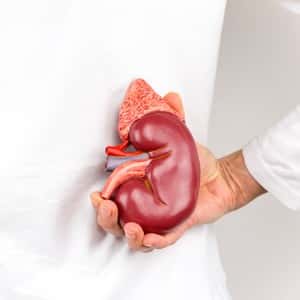
When the first proton pump inhibitor drug, omeprazole (Prilosec), was introduced, it was greeted enthusiastically. It appeared to reduce symptoms of acid reflux and GERD (gastroesophageal reflux disease) very well. At first, doctors thought it had hardly any side effects. That enthusiasm held up through the development and marketing of numerous other medicines in the PPI category, but we are learning that they can have significant complications. The most recent is harming your kidneys.
Are PPIs Harming Your Kidneys?
Q. I have been taking PPIs like omeprazole and lansoprazole for reflux for a decade. My creatinine numbers are climbing and I am afraid these drugs could be harming my kidneys.
My doctor says acid-suppressing drugs are fine; he takes one too. But as I age I worry more about my kidneys so I’ve decided to go off the medicine.
I cut down very gradually and now I’m off altogether. If I get a little heartburn, I suck on a hard candy. That increases saliva and helps with reflux.
A. A recent study suggests that patients taking acid-suppressing drugs long term may be at risk for higher creatinine levels and kidney trouble (Journal of the American Society of Nephrology, online April 14, 2016). Creatinine is a marker for kidney function, with higher numbers suggesting poorer function. While it is not possible to tell whether the PPIs you have been taking are harming your kidneys, your move to stop taking them is prudent.
Getting Off PPIs:
Your decision to cut down on the dose gradually is sensible. Many people find it difficult to discontinue a PPI such as esomeprazole (Nexium) or lansoprazole (Prevacid) because stopping suddenly triggers rebound heartburn. You can read more about PPI withdrawal symptoms here.
Faced with horrible heartburn, some folks never manage to stop taking their PPI. But a number of serious side effects have surfaced over the last several years. As a result, it seems wise to use these drugs when necessary, but for no longer than necessary.
PPI Side Effects:
People taking PPIs are more susceptible to infections leading to pneumonia (JAMA, May 27, 2009) or severe diarrhea (JAMA Internal Medicine, May, 2015). These medications can interfere with proper absorption of vitamins and minerals and also some medications that require acid for absorption, such as alendronate (Archives of Internal Medicine, June 13, 2011). Poor absorption of calcium and magnesium might be partially responsible for a greater susceptibility for hip fracture among long-term users (BMJ, Jan. 31, 2012).
Other concerns for long-term users are heart attacks (PLOS One, June 20, 2015), dementia (JAMA Neurology, April, 2016) and now kidney disease. We have written more in depth about PPI side effects here. You can also learn about calming heartburn symptoms without taking a PPI in our Guide to Digestive Disorders.

